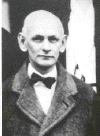
SHEPHERD IVORY FRANZ
GOVERNMENT HOSPITAL FOR THE INSANE,
WASHINGTON, D. C.
|
Review of "An Experimental Study of Sleep" (1908) Journal of Philosophy, Psychology, and Scientific Methods, 1909, 6, 442-443. |
An Experimental Study of Sleep. BORIS SIDIS. Boston: Badger. 1909. Pp. viii + 106.
In this work the author records the results of numerous experiments on the production of sleep in animals and in children, the characters of reactions found in sleeping individuals, and uses this material to construct a theory of sleep. In the discussion of his results we find much on allied states, hypnoidal and hypnotic, as well as on sleep. Much of the experimental part is similar to and in accord with the work of Heubel, and in the theoretical portion the main viewpoint of Claparède is taken.
Emphasis is laid on the psychic factors in sleep and any supposition: of toxic influences or conditions is shown not to be necessary, and in fact, to be contrary to certain facts that have been observed.
In addition to the three states commonly considered to be the only possibilities, sleep, waking, and hypnosis, Sidis differentiates a fourth state, intermediate between the hypnotic and sleep states, to which he has given the name hypnoidal. This state we pass through when going to sleep and also when awaking. We also have to pass through this state when being placed in a hypnotic condition, and we pass through it when returning to normal from the hypnotic state. An individual may be asleep, be partly, "waked," and thus put into the hypnoidal state, and thence led into the hypnotic state. In this way the relationship of hypnosis and sleep is much more easily understood. At times it appears as if the author identified this intermediate, hypnoidal state with all subwaking states; but it is difficult to determine whether or not he believes the hypnoidal to be a special kind of subwaking state. This intermediate state is given two names, hypnagogic and hypnapagogic, depending upon the condition to which it leads, sleep or wakefulness.
It is in this intermediate state that Sidis locates dreams, for in it he finds a crowd of hallucinations. Another work is promised on this interesting topic; and we need not prematurely consider the author's views on the matter at the present time.
The general position of Claparède is taken, viz., that sleep is not a disease. It is not a pathological state, it is not due to toxins, or autointoxication, and is not caused by cerebral or nervous anemia or hyperemia. Sleep is an active function, "as much of an instinct as hunger or sex. "Phylogenetically and ontogenetically, the sleep states of higher animals are developed out of undifferentiated, intermediary, subwaking, hypnoidal-like states found in the resting states of the lower representatives of animal life. The hypnoidal state is the primitive rest state out of which sleep arises." Briefly put, the hypnoidal state is the germ of sleep. Physiologically and psychologically considered, sleep is an actively induced passive state in relation to the external environment; the psychophysical systems have their threshold raised in relation to the external stimulations; the rise of threshold is induced by a mass of impressions possessing little or no variability, by limitation or by relative withdrawal of stimulations, or, what is the same, by monotony of stimulations, and by limitation of voluntary movements." As compared with the rise of threshold in sleep, the author considers there is a lowering of the threshold in hypnosis, but the reviewer has not found any indication of the author’s view of the threshold condition in the intermediate, hypnoidal state.
A further distinction between sleep and hypnosis is made, that in the former there is a relaxation of the attention, and in the latter there is a fixation of the attention.
It may be said that the monograph is a reprint from the Journal of Abnormal Psychology without acknowledgment. A bibliography of about 250 titles is appended; but it has no relation to the matter of the monograph, for few of the books and articles are referred to in the body of the work, and some of those to which attention is called are not included in the bibliography. It is unfortunate that the author did not consider it necessary to be more specific in the bibliography, because dates, and in referring to general works not especially pertaining to the subject, page references would have added to its value. Nearly half of the references are without any indication of date of publication; and there are no page references.

SHEPHERD
IVORY FRANZ
GOVERNMENT HOSPITAL FOR THE INSANE,
WASHINGTON, D. C.